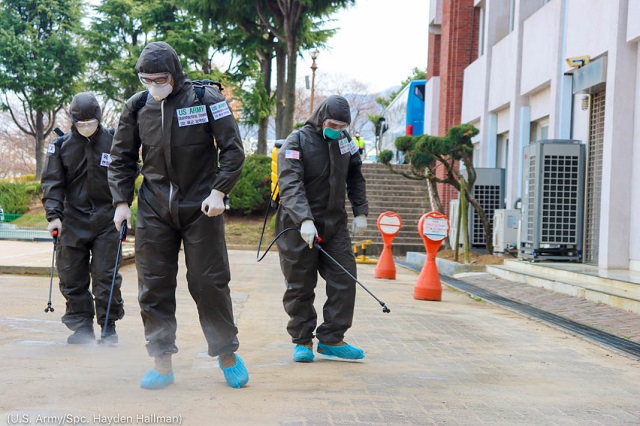The United States is resuming support for the World Health Organization, which plays a vital role in fighting the global COVID-19 pandemic.
President Biden announced the renewed commitment to the WHO in a January 20 letter to United Nations Secretary-General António Guterres, reversing the prior administration’s plan to leave the U.N.’s public health arm in July.
“The WHO plays a crucial role in the world’s fight against the deadly COVID-19 pandemic as well as countless other threats to global health and health security,” Biden said in the letter. “The United States will continue to be a full participant and a global leader in confronting such threats and advancing global health and health security.”
The renewed support for the WHO was one of a series of actions Biden took after his inauguration to end COVID-19 and strengthen U.S. leadership on global challenges.

Soldiers from the United States and the Republic of Korea spray a COVID-19-infected area in Daegu, South Korea, March 13, 2020. (U.S. Army/Spc. Hayden Hallman)
On January 21, Dr. Anthony Fauci, the U.S. government’s top expert on diseases, told a meeting of the WHO’s executive board the United States will work multilaterally to fight COVID-19 and participate in joint efforts to distribute vaccines and therapeutics, such as the COVID-19 Vaccines Global Access (COVAX) initiative and the Access to COVID-19 Tools (ACT) Accelerator.
“The United States sees technical collaboration at all levels as a fundamental part of our relationship with WHO, one that we value deeply and will look to strengthen going forward,” Fauci said.
The new administration also will strengthen U.S. efforts to fight COVID-19 and respond to future pandemics. A seven-point plan to fight COVID-19 calls for providing consistent evidence-based guidance, distributing vaccines and treatments equitably, and imposing nationwide mask mandates, among other actions.
The administration will restore the White House National Security Council Directorate for Global Health Security and Biodefense, re-launch a U.S. Agency for International Development pathogen-tracking program and expand the Centers for Disease Control and Prevention’s number of disease detectives.
Since the outbreak of COVID-19, the State Department and USAID have announced more than $1.5 billion in aid to help governments, nonprofits and international organizations fight the pandemic. The funding saves lives by improving public health education, supporting health care facilities and increasing disease surveillance in more than 120 countries.







COMMENTS0
LEAVE A COMMENT
TOP